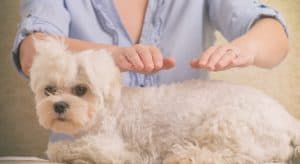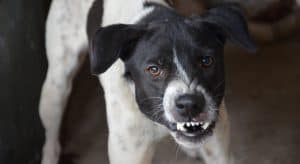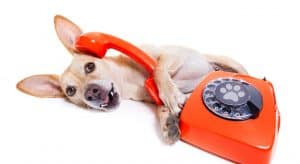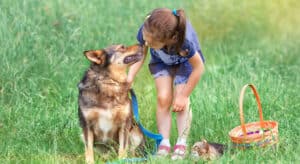Puppies as well as being adorable are also creatures of habit. Puppies need routine in their lives as otherwise if left to their own devices things could become chaotic and out of control.
Why Are Schedules Important for Puppies?
A schedule gives a puppy certainty and structure. The puppy will soon learn what to expect each and every day. This will give him security and reassurance and make a puppy happy as they thrive on these routines.
When devising a schedule or routine everyone in the household should be either involved in the routine or is made aware of it. Creating a schedule does not mean that every single minute of the pup’s life has to be planned in detail. Be consistent with feeding, toilet breaks, play & exercise, and finally sleeping times. Ideally, everyone should be involved in taking care of the new puppy so there no miscommunication. For example, make sure that the puppy is not overfed as there was some type of misunderstanding between household members.
Puppy Schedules should revolve around 4 main areas
1. Food
2. Toilet Breaks
3. Play & Exercise
4. Sleeping
1. Food
You will need to establish a feeding routine for the new puppy. Puppies normally eat three times a day. If you can stick to set times and be consistent with feeding this will help the puppy’s internal system sync with this feeding time. The puppy’s digestive system and metabolism will adapt to these times ultimately making toilet breaks more predictable.
It’s also important not to overfeed the puppy. Stick to the recommended feeding amount. Most dogs and especially puppies will always want more food after you feed them. You will get that sad puppy look wanting more – but don’t give in. Overfeeding is not good and will lead to weight gain.
Another important issue with feeding is to try and ensure that the puppy eats in the same place every day. This could be the kitchen or utility room. Either way, stick to this place. It will give your puppy reassurance and security. . Consequently, the puppy will have to worry or be anxious in a new room that would not be as familiar. Sometimes puppies can be scared of new objects, loud noises, and bangs.
Always allow your puppy access to water. The only time you need to restrict access to water is about an hour or so before bedtime so as to prevent accidents during the night. The last feed should be roughly 3 hours before bedtime.
Young puppies will normally need to urinate or defecate after consuming food and this depends on your pup’s metalobilsm. Some puppies need to go to the toilet within a few minutes after eating and some puppies will be able to hold out for at least 30 minutes or so.
2. Toilet Breaks
Dogs are great at reading human body language so you will have to learn to read puppy body language. This will be particularly helpful when you learn to spot a puppy just before urination or defecation. It’s always best to plan ahead and try and prevent certain scenarios and if you can prevent a poop in the house that’s always good news.
The best time to bring your puppy out for a toilet break is when he wakes up after a sleep or shortly after mealtimes. As soon as you can, bring your puppy outside and wait until the business is complete. Again lots of praise and encouragement. These frequent toilet breaks will help your puppy to establish the connection between being outside and toilet breaks.
As your puppy learns the ropes and grows older these numerous outside toilet breaks will reduce in frequency. However, accidents still can happen, and if you do spot a wet stain just clean it thoroughly to eliminate any odor (Puppies can sometimes go back to the previous spot to urinate if the smell still lingers). Never scold a puppy or dog after an accident. It will only scare and frighten the dog and can lead to further problems down the road. If you do spot your puppy urinating inside then don’t make a huge deal about it, simply clap your hands and say in firm voice “No”. Do not scorn the puppy, just quickly take him outside to finish the business. When the puppy has finished give plenty of praise and encouragement.
3. Play & Exercise
Exercise is important for all of us including cute puppies. Most dogs and puppies included would eat non-stop if you let them. Obviously, this would not be good for anyone. If you do have a chubby puppy it’s important to stick to the recommended feeding guidelines. Make sure the puppy is not getting any table scraps from anyone in the household or even begging for more food.
Puppies will naturally run about the place and exude lots of energy in their play. This type of exercise is great for their metabolism and well-being. If your puppy has not yet been fully vaccinated and so you are unable to go outside for walks then you can still play and engage with the puppy. Most puppies are active bundles of joy but if you suspect your puppy is not as active as he should be then it is always a good idea to inform your veterinarian. The vet can run a check to make sure everything is working as it should. The vet could also check for a worm infestation as sometimes puppies that have worms are often lethargic and not interested in play.
Another good tip is to try and walk your puppy around the same time every day. Again this time will become ingrained in your dog’s internal clock and so at this time every day your puppy will come to expect a walk. Ultimately this makes your dog happy and will help build an unbreakable bond between the two of you.
4. Sleeping
Young puppies can sleep on average from 18 to 20 hours per day. As the puppy grows these sleeping times will be reduced and on average an adult dog sleeps roughly 12/14 hours a day. However, during puppy-hood getting enough sleep is vital. Sleep helps puppies grow and develop. During this time puppies require sleep as their little bodies are growing rapidly and their brains are developing.
Puppies can be full of life one moment running about and causing mayhem and within seconds they could be fast asleep after the exertion. Puppies can fall asleep anywhere. A safe and quiet place to nap works great and away from any excitement or drama that would get him up and running again. If there are children about make sure to let them know it’s important that a puppy sleeps undisturbed as puppies need sleep to grow. As soon as the puppy wakes the children can play.
Sample Daily Schedule For A Puppy
Always devise a puppy schedule to suit you or your family’s routine as otherwise, it will not work. So if you normally wake at 7 am build the schedule around this start time.
The following is a sample schedule for a puppy.
| MORNING | |
| TIME | ACTIVITY |
| 7.00 am | Wake up |
| 7.05 am | Toilet break |
| 7.30 am | Breakfast |
| 8.00 am | Toilet break |
| 8.15 am | Sleep / Nap |
| 10.00 am | Toilet break |
| 10.15 am | Exercise / Playtime |
| 11.00 am | Sleep / Nap |
| AFTERNOON | |
| 1.00pm | Toilet break |
| 1.15 pm | Exercise / Playtime |
| 2.00 pm | Feeding |
| 2.30 pm | Toilet break |
| 2.45 pm | Sleep / Nap |
| 5.00 pm | Toilet break |
| 5.15 pm | Exercise / Playtime |
| 6.00 pm | Feeding (Last Meal of the Day) |
| 6.15 pm | Toilet break |
| 6.30 pm | Sleep / Nap |
| EVENING | |
| 8.00 pm | Toilet break |
| 8.15 pm | Exercise / Playtime |
| 8.45 pm | Toilet break (Last one before bedtime) |
| 9.00 pm | Wind-down followed by bedtime |
Sources
https://en.wikipedia.org/wiki/Dog







